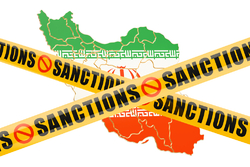 In great violation of UN Charter and international law, and with no international accountability, the United States is currently engaged in illegal and comprehensive economic blockades against Iran, North Korea and Venezuela, as well as several lesser blockades against countries such as Cuba and Nicaragua, and an intensifying effort to cut off China's access to technology.
In great violation of UN Charter and international law, and with no international accountability, the United States is currently engaged in illegal and comprehensive economic blockades against Iran, North Korea and Venezuela, as well as several lesser blockades against countries such as Cuba and Nicaragua, and an intensifying effort to cut off China's access to technology. RNA - The blockade against North Korea is sanctioned, at least in part, by the UN Security Council. The blockade against Iran is in direct opposition to the Security Council. And the blockade against Venezuela is so far without Security Council engagement for or against.
The US is attempting to isolate the three countries from almost all international trade, causing shortages of food, medicines, energy, and spare parts for basic infrastructure, including the water supply and power grid. This is because they are not on the same page as Washington in regional matters.
The North Korean blockade operates mainly through UN-mandated sanctions, and includes a comprehensive list of exports to North Korea, imports from North Korea, and financial relations with North Korean entities.
The UN Food and Agriculture Organization reports that ten million North Koreans are at risk of hunger, partly owing to sanctions.
The..."negative impact sanctions can have on agricultural production, through both direct and indirect impacts, cannot be ignored," the FAO warns. "The most obvious are restrictions on the importation of certain data-x-items that are necessary for agricultural production, in particular fuel, machinery and spare parts for equipment."
The draconian US sanctions on Venezuela have come in two phases. The first, beginning in August 2017, was mainly directed at the state oil company PDVSA, the country's main earner of foreign exchange; the second round of sanctions, imposed in January 2019, was more comprehensive, targeting the Venezuelan government.
A recent detailed analysis of the first round of sanctions shows their devastating impact. The US sanctions gravely exacerbated economic mismanagement, contributing to a catastrophic fall in oil production, hyperinflation, economic collapse, hunger, and rising mortality.
US illegal sanctions against Iran have been in place more or less continuously since 1979. The most recent and by far most draconian measures, introduced in August 2018 and intensified in the first half of this year, aim to cut Iran off from foreign trade.
The US illegal sanctions are in direct contravention of UN Security Council Resolution 2231, which endorsed the 2015 nuclear agreement with Iran. The effects have been inhumane.
One might expect that other countries would easily circumvent these illegal sanctions. But the US has threatened to punish foreign companies that violate the sanctions and has used the dollar's global clout as a bludgeon, threatening to sanction foreign banks that finance trade with Iran.
European companies have fallen into line, despite the European Union's political support for the UN resolution and nuclear deal with Iran. The history of the past 40 years shows that over the longer term, more ways will be found to circumvent the sanctions, using renminbi, ruble, or euro financing.
Despite the intense economic pain inflicted on North Korea, Venezuela, and Iran, none of them has succumbed to US demands. In this sense, sanctions have proved to be no more successful than military intervention.
According to Fars News Agancy, North Korea has maintained, and most likely is expanding, its nuclear arsenal. The Iranian government rejects US demands concerning its missile program and foreign policies. And Venezuela's President Nicolás Maduro remains in power.
The US blockades have been carried out by presidential decrees and mostly on the basis of congressional ratifications and oversight. Yet under President Trump, this has been a one-man show, even more so than in the case of president-led wars, which trigger vastly more public scrutiny. Trump realizes that he can impose sanctions abroad with virtually no political or international accountability.
Military blockades are acts of war, and therefore subject to international law, including UN Security Council oversight. America's economic blockades are similar in function and outcome to military blockades, with inhumane consequences for civilian populations, and risk provoking war. It is time for the Security Council to take up the US sanctions regimes and economic terrorism and weigh them against the requirements of international law and peacekeeping.
847/940